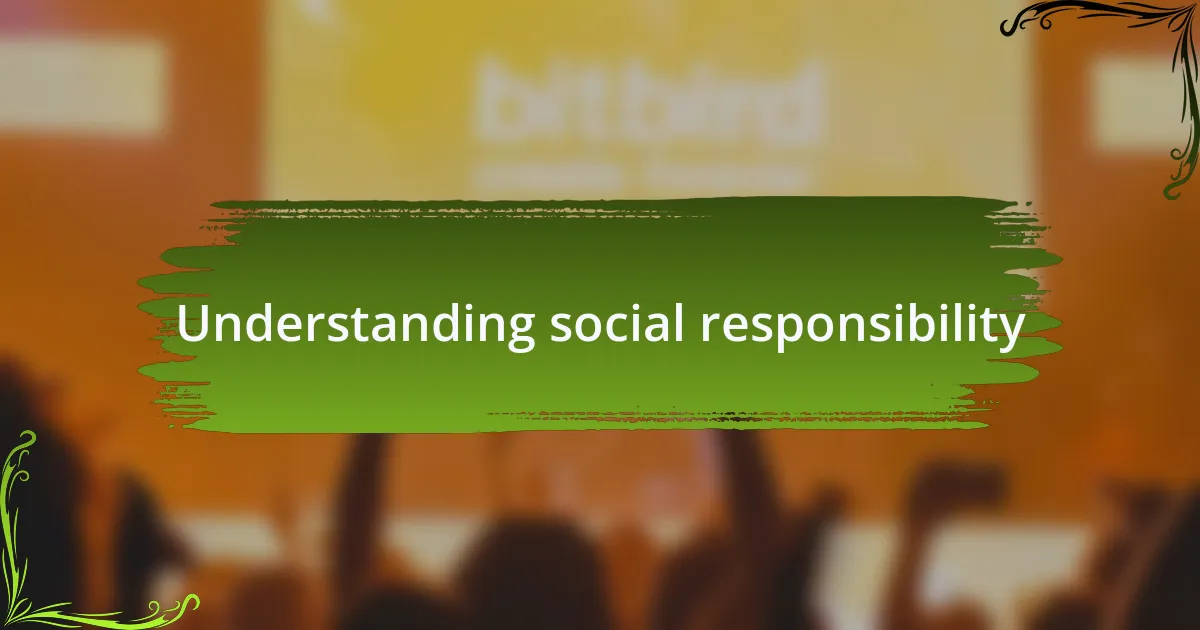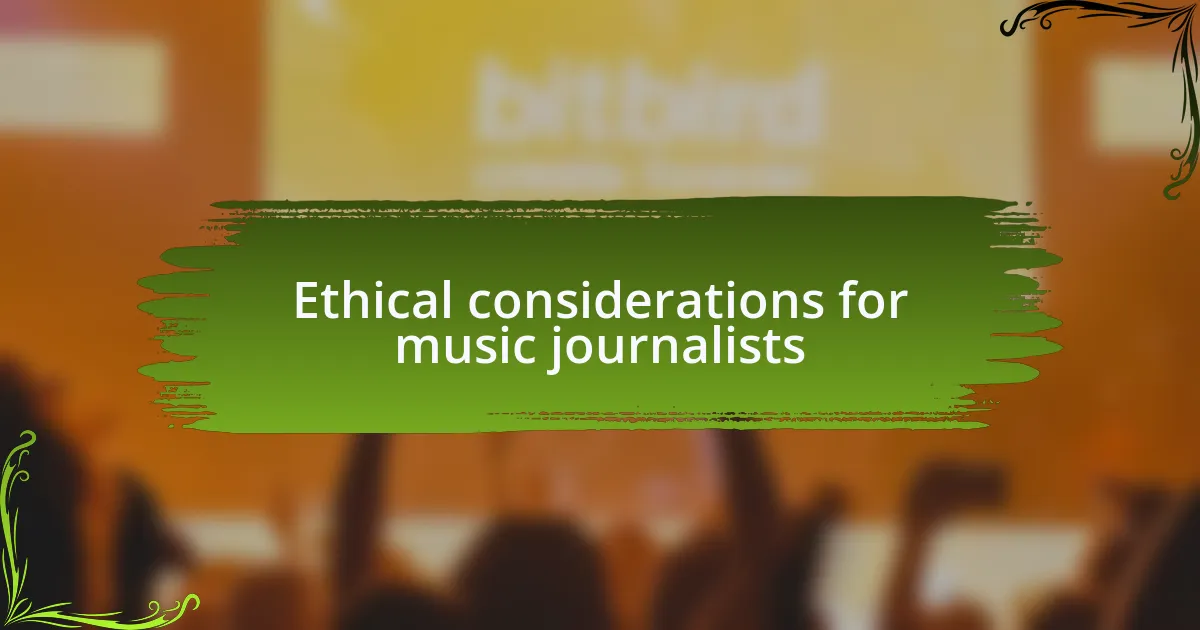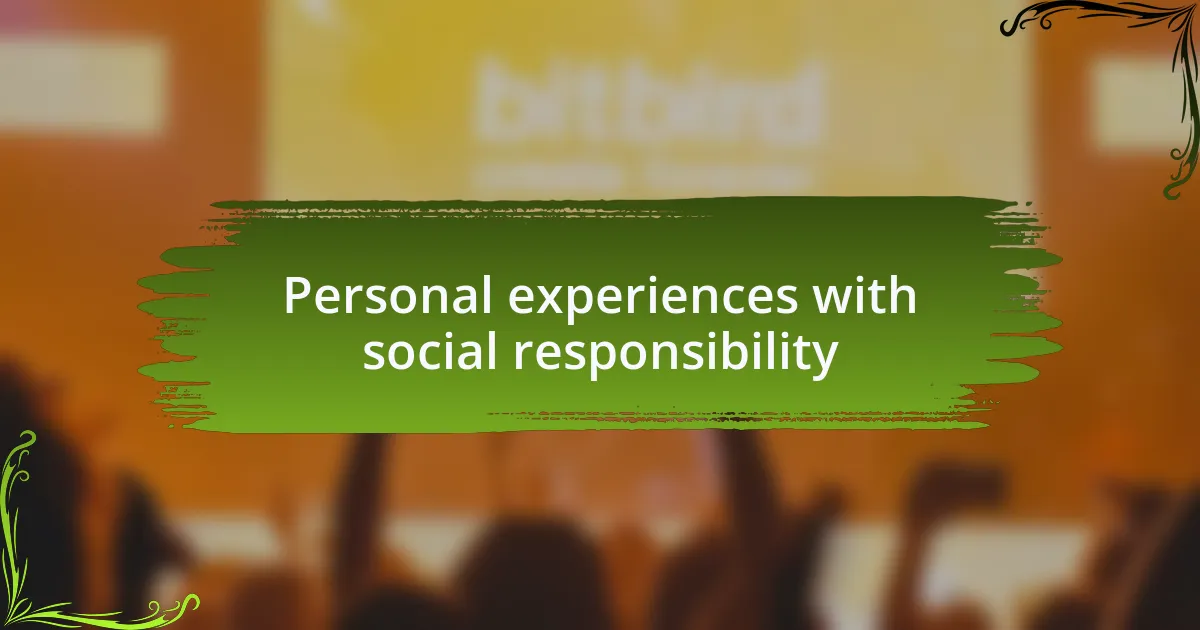Key takeaways:
- Social responsibility involves individuals and organizations acting in the best interests of society and the environment, impacting choices and promoting sustainable practices in music.
- Music journalists face ethical considerations in their reporting, including the responsibility of language, the importance of transparency, and the influence of relationships with artists on their integrity.
- Personal experiences, like volunteering at music festivals and participating in discussions, highlight the role of music as a catalyst for social change and community engagement.
- Engagement with social responsibility requires journalists to amplify meaningful stories and connections within their communities, beyond just reporting facts.

Understanding social responsibility
Social responsibility refers to the idea that individuals and organizations have a duty to act in the best interests of their surroundings, including society and the environment. I remember attending a local music festival where the organizers made a point to highlight sustainable practices, like using eco-friendly materials and promoting local artists. It struck me how music can inspire positive change, prompting us to reflect on our role in the community.
Understanding social responsibility is also about recognizing the power of our choices. For instance, when I choose to support artists who advocate for social causes, I feel like I’m contributing to a larger movement. Isn’t it inspiring to think that a single song can spark conversations about vital issues, encouraging listeners to take action? It’s like a ripple effect; one small choice can lead to significant changes.
Moreover, social responsibility plays a crucial role in how we consume and engage with music. I once found myself questioning my own consumption habits after realizing how some streaming platforms affect artist livelihoods. This led me to seek out more ethical choices, reminding me that our support can uplift deserving voices while making a meaningful impact. How do you engage with social responsibility in your own music journey?

Ethical considerations for music journalists
Ethical considerations for music journalists extend beyond reporting. I remember when I wrote a piece about a controversial band. Some readers felt misrepresented, voicing concerns over how language can shape perception. It made me realize that each choice of words carries a responsibility; it can either foster understanding or create division. Are we, as journalists, fully aware of the impact our stories can have?
Another critical aspect is transparency. I once worked on a feature that involved speaking with a smaller artist who opened up about their struggles within the industry. It was vital to accurately convey their experiences without sensationalism. I often ask myself, how can I balance storytelling with honesty? I’ve learned that presenting an artist’s truth respectfully not only honors their journey but also informs the audience in a meaningful way.
Additionally, the relationships we build with artists can influence our integrity as journalists. I recall a time when I opted not to publish a review that didn’t align with my values simply because it was trending. It highlighted a personal struggle between professional ambition and ethical responsibility. Isn’t it important to remember that our credibility depends on our commitment to truth and advocacy within the music industry?

Personal experiences with social responsibility
When I first started attending music festivals, I was struck by the community vibe, but I couldn’t ignore the environmental impact they had. One year, I volunteered for a cleanup crew, and it opened my eyes to how much waste was generated. It was a small step, yet witnessing the collective effort of festival-goers working together made me wonder: how can we foster this sense of responsibility beyond just one event?
A few years ago, I participated in a panel discussion about the role of music in social movements. Listening to artists share their motivations and the causes they support was incredibly inspiring. It made me reflect on how I use my platform as a music journalist. Am I amplifying the voices that matter? I strive to feature stories that promote social change, believing that music can be a powerful catalyst for awareness.
One particularly memorable experience was when I covered a benefit concert for mental health awareness. It was heartwarming to see artists come together for a cause close to many hearts. I felt a deep sense of connection with the audience, who shared their own stories with me. This taught me that social responsibility isn’t just about reporting facts; it’s about engaging with our communities and highlighting issues that truly matter. How often do we, as music journalists, take the time to make those connections and inspire change?